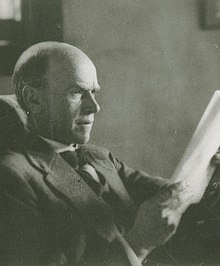Elton Mayo | |
|---|---|
 Elton Mayo c. 1935 | |
| Born | George Elton Mayo 26 December 1880 Adelaide, Australia |
| Died | 7 September 1949 (aged 68) Guildford, Surrey, UK |
| Occupation(s) | Psychologist, industrial researcher, organisational theorist |
| Spouse |
Dorothea McConnel (m. 1913) |
| Children | 2 |
| Relatives | Helen Mayo (sister) Herbert Mayo (brother) George Mayo (grandfather) |
George Elton Mayo (26 December 1880 – 7 September 1949) was an Australian born psychologist,[1][2][3] industrial researcher, and organizational theorist.[4][5] Mayo was formally trained at the University of Adelaide, acquiring a Bachelor of Arts Degree graduating with First Class Honours, majoring in philosophy and psychology,[4] and was later awarded an honorary Master of Arts Degree from the University of Queensland (UQ).
While in Queensland, Mayo served on the University's war committee and pioneered research into the psychoanalytic treatment of shell-shock. As a psychologist Mayo often helped soldiers returning from World War I recover from the stresses of war and with a Brisbane physician, pioneered the psychoanalytic treatment of shell-shock and conducted psycho-pathological tests.[4][6] He was a lecturer in psychology and mental philosophy at the UQ between 1911 and 1922, when he sailed to the United States.[4] In 1926 he was appointed to the Harvard Business School (HBS) as a professor of industrial research.[4][7]
In Philadelphia he conducted research at a textile plant in order to develop a method to reduce the very high rate of turnover in the plant.[8] Mayo's association with the Hawthorne studies as well as his research and work in Australia led to his enjoying a public acclaim granted to few social scientists of his day.
Mayo has been credited with making significant contributions to a number of disciplines, including business management, industrial sociology, philosophy, and social psychology. His field research in industry had a significant impact on industrial and organizational psychology.[9] According to Trahair, Mayo "is known for having established the scientific study of what today is called organizational behavior when he gave close attention to the human, social, and political problems of industrial civilization." (p. 15).[9]
Mayo's work helped to lay the foundation for the human relations movement.[4] He emphasized that alongside the formal organization of an industrial workplace there exists an informal organizational structure as well.[4] Mayo recognized the "inadequacies of existing scientific management approaches" to industrial organizations, and underlined the importance of relationships among people who work for such organizations.[5] His ideas on group relations were advanced in his 1933 book The Human Problems of an Industrialized Civilization, which was based partly on his Hawthorne research.[10]
- ^ "Mayo, George Elton (1880–1949)". Biography – George Elton Mayo – Australian Dictionary of Biography. National Centre of Biography, Australian National University. Archived from the original on 24 October 2013.
{{cite book}}:|work=ignored (help) - ^ "Elton Mayo". Encyclopædia Britannica. Archived from the original on 26 October 2014.
- ^ "Archived copy". Archived from the original on 18 April 2014. Retrieved 19 December 2014.
{{cite web}}: CS1 maint: archived copy as title (link) - ^ a b c d e f g Cullen, David O'Donald. A new way of statecraft: The career of Elton Mayo and the development of the social sciences in America, 1920–1940. ProQuest Dissertations and Theses; 1992; ProQuest Dissertations & Theses Full Text.
- ^ a b Miner, J.B. (2006). Organizational behavior, Vol. 3: Historical origins, theoretical foundations, and the future. Armonk, NY and London: M.E. Sharpe.
- ^ "Enter Elton Mayo". hbs.edu. Archived from the original on 12 May 2015.
- ^ Acton, Ryan M. (2023). "The Search for Social Harmony at Harvard Business School, 1919–1942". Modern Intellectual History. 20 (1): 141–167. doi:10.1017/S1479244321000706. ISSN 1479-2443. S2CID 246350331.
- ^ Mayo, E. (1924). Revery and industrial fatigue. Journal of Personnel Research, 3, 273–281.
- ^ a b Trahair, R. C. S. (1984). Elton Mayo: The humanist temper. Piscataway, NJ: Transaction
- ^ Mayo, E. (1933). The human problems of an industrial civilization. Cambridge, MA: Harvard.